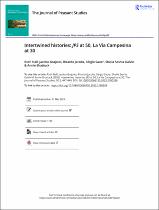| dc.contributor.author | Hall, Ruth | |
| dc.contributor.author | Grajales, Jacobo | |
| dc.contributor.author | Jacobs, Ricardo | |
| dc.date.accessioned | 2023-06-14T09:13:39Z | |
| dc.date.available | 2023-06-14T09:13:39Z | |
| dc.date.issued | 2023 | |
| dc.identifier.citation | Hall, R. et al. (2023). Intertwined histories: JPS at 50, La Via Campesina at 30. The Journal of Peasant Studies, 50(2), 447–448. https://doi.org/10.1080/03066150.2023.2180358 | en_US |
| dc.identifier.issn | 1743-9361 | |
| dc.identifier.uri | https://doi.org/10.1080/03066150.2023.2180358 | |
| dc.identifier.uri | http://hdl.handle.net/10566/9080 | |
| dc.description.abstract | The Journal of Peasant Studies was founded 50 years ago, in 1973, amidst an oil price crisis, the end of the gold standard and the beginning of the debt crisis, an agrarian famine in Bangladesh, and what some consider the last of the ‘peasant wars’. Twenty years later, when the peasant movement La Via Campesina (LVC) was born in 1993, the world was in another cataclysmic moment: the end of the Cold War consolidated the neoliberal orthodoxy that had already wrought violence in the form of structural adjustment policies that dismantled public institutions, deregulated trade, and provoked resistance – including transnational alliances across rural social movements. Today LVC brings together 182 organisations of peasants, small farmers and fishers, and rural workers from 81 countries under the banner of food sovereignty. | en_US |
| dc.language.iso | en | en_US |
| dc.publisher | Taylor and Francis Group | en_US |
| dc.subject | Agrarian studies | en_US |
| dc.subject | Bangladesh | en_US |
| dc.subject | Public institutions | en_US |
| dc.subject | Food security | en_US |
| dc.subject | Farming sector | en_US |
| dc.title | Intertwined histories: JPS at 50, La Via Campesina at 30 | en_US |
| dc.type | Article | en_US |

